Nursing Burnout Statistics – By Country, Demographic, Field and Reasons
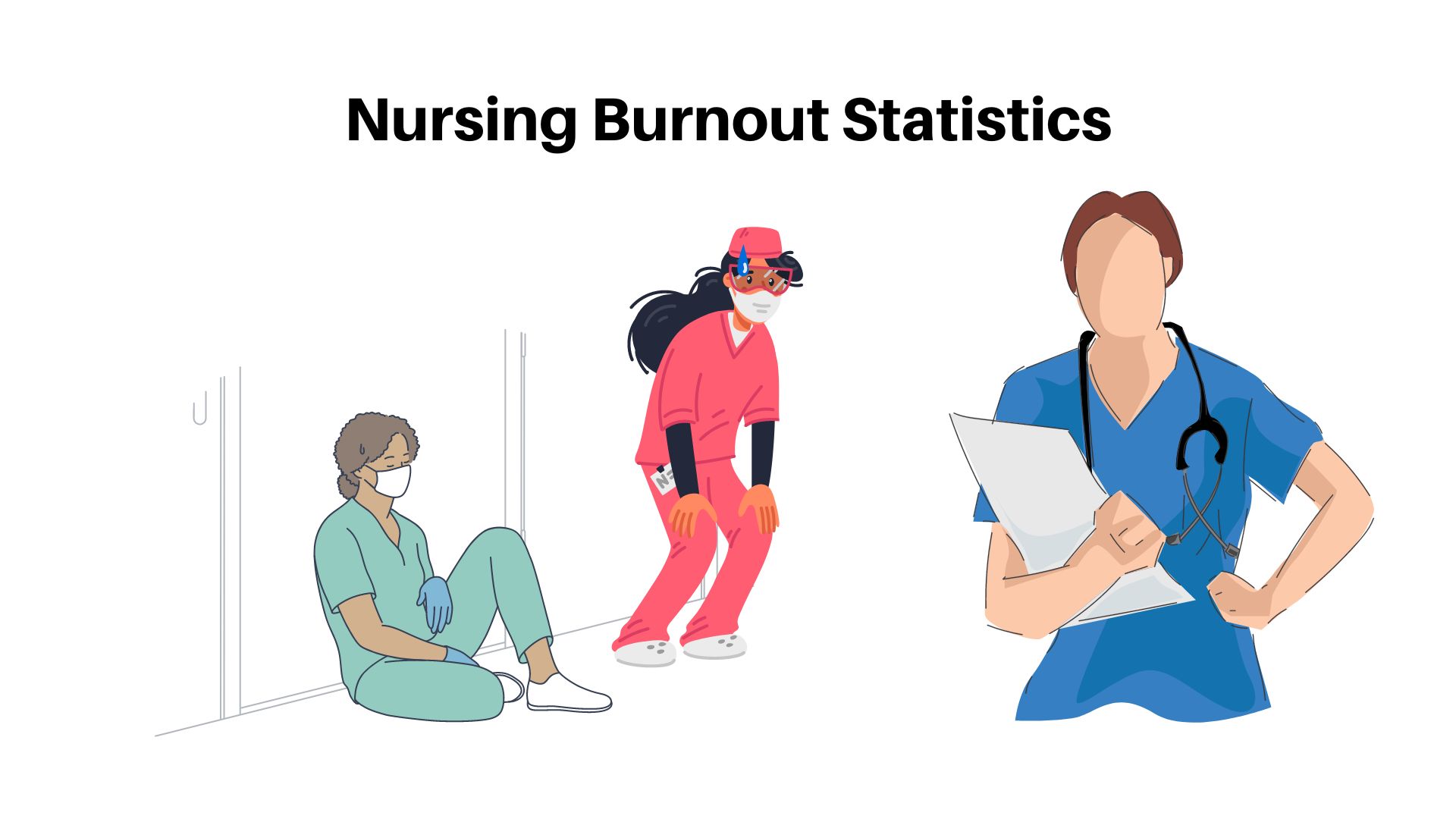
Page Contents
- Introduction
- Editor’s Choice
- What is Nursing Burnout?
- Reasons For Nursing Burnout
- Effects Of Nursing Burnout On Patients
- General Nursing Burnout Statistics
- By Country
- By The Level Of Concern
- By Demographic
- By Gender
- By Working Experience
- By Field
- By Reasons
- By Addressing The Issue
- By Post-pandemic Effects On Nurses
- Conclusion
Introduction
Nursing burnout Statistics: Considering the pandemic and post-pandemic time, nursing burnout has become a significant issue in the healthcare industry. We have seen the problems faced by the nurses during the lockdown about they were treated and what kind of exhaustion they faced. But even after 2 years of that event the healthcare industry is still facing the same problem. The major reason behind this problem is the low level of hiring in the nursing segment in healthcare units around the world.
These nursing burnout statistics are written with insights from around the globe to understand the severity of the problem. It has included various types of content along with interesting graphics for a better level of understanding.
Editor’s Choice
- In the United States of America, there are around 2.7 million nurses who reported feeling burnout during work in 2022.
- As of today, Belgium has 60% of the burnout nurses while there are 40% in Uganda.
- According to Nursing burnout statistics, there are around 81.2% of female nurses and 18.8% of male nurses feel burned out during the sessions of their job.
- 5% of the nurses in China had suicidal thoughts while 17% of nurses in Australia took mental health support.
- 6% belonged to the age group of 26 years to 30 years facing the highest number of burned out in all the other age groups.
- On average today, nursing burnout statistics say that low staffing resulting in 80.19% was the main reason for burnout.
- 46% and 22% belong to the reasons of ethical dilemmas physical attacks from patients or patients’ families in the United States of America.
- According to the Nursing burnout statistics, it has been estimated that the world will face a shortage of nurses by the year 2030 resulting in a number of 13 million.
- As of today, the turnover rate of nurses due to burnout is 27.1%.
- For every 1% of the turnover in the nursing field, it will cost hospitals around $2,62,300 every year.
What is Nursing Burnout?
Nursing burnout refers to the stress levels caused by the workloads of the nurses as well as exhaustion, low motivation increased feelings of frustration, and work efficiency. Nursing burnout has increased since the pandemic hit the world and due to the lack of doctors and nurses, the pressure of handling overloaded patients in the hospitals caused nurses to go through a complete meltdown during work hours.
Reasons For Nursing Burnout
- No support was received from hospitals or their supervisors or colleagues.
- Compulsory allocation of job responsibilities other than designated ones.
- Emotional stress.
- Lack of family support.
- Irregular sleep cycles, unfulfilled sleep, unhealthy food consumption.
- No time to eat food.
- The aggressive attitude from patients.
- Long-lasting shifts.
- Too much work responsibility.
- Insufficient breaks.
Effects Of Nursing Burnout On Patients
- Low motivation in patients to get cured.
- Aggressive behavior of nurses.
- Possibilities of ignorance and irresponsibility towards the patients.
- The high turnover rate of nurses.
- The damaged brand image of the hospital.
General Nursing Burnout Statistics
- As of today, the turnover rate of nurses due to burnout is 27.1%.
- Around 30% of nurses in the United States of America left their job in the year 2021.
- From the pandemic till today, the reason for nursing burnout has been felt by 62% of nurses.
- In the United States of America, there are around 2.7 million nurses who reported feeling burnout during work in 2022.
- According to the Nursing burnout statistics, it has been estimated that the world will face a shortage of nurses by the year 2030 resulting in a number of 13 million.
- Furthermore, for every 1% of the turnover in the nursing field, it will cost hospitals around $2,62,300 every year.
- There’s only 1 nurse for every 4 patients, which increases the risk of death by 7%.
- Every year, 44% of nurses want to leave the profession because of burnout reasons.
By Country
- As of today, Belgium has 60% of the burnout nurses while there are 40% in Uganda.
- 63% of stressed nurses are from the United States of America.
- Similarly, nurses in Oman reported that 38% felt depressed while 73% faced troubles while sleeping.
- 5% of the nurses in China had suicidal thoughts while 17% of nurses in Australia took mental health support.
By The Level Of Concern
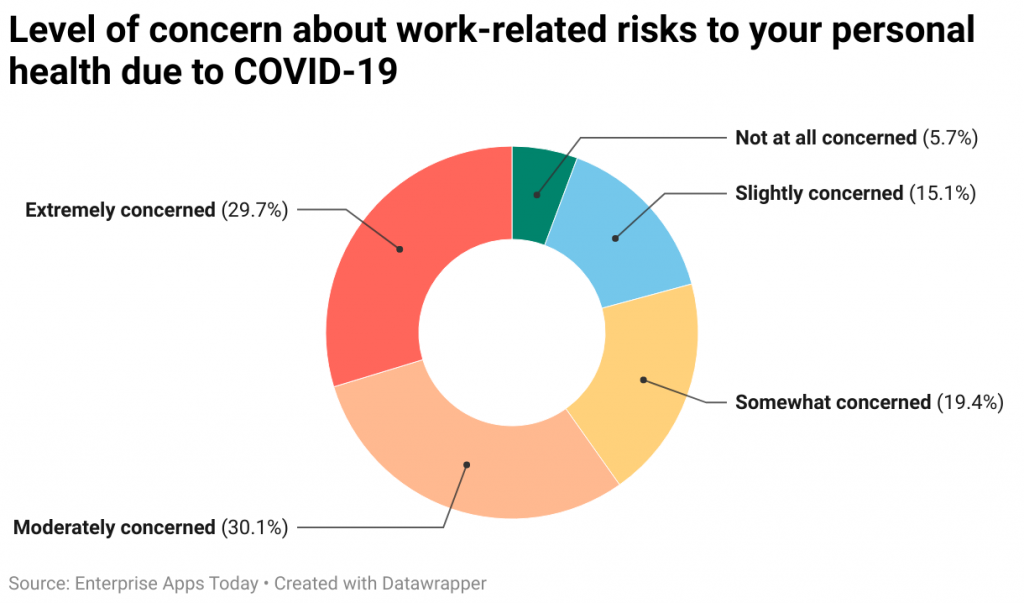
(Source: RNAO)
- As of today, the prevailing COVID-19 is still affecting the personal health of nurses around the world. There are 5.7% of the nurses are not at all concerned about this.
- While 15.1% of nurses said they are slightly concerned while 19.4% stated that they are somewhat concerned about COVID-19’s work-related risks to personal health.
- The highest number of nurses said that they are moderately concerned on the other hand,29.7% said they are extremely concerned.
By Demographic
By Gender
| Gender | |
|---|---|
| Female | 81.2% |
| Male | 18.8% |
(Source: NCBI)
- According to Nursing burnout statistics, there are around 81.2% of females feel burned out during the sessions of their job.
- Similarly, there are only 18.8% of male nurses feel burnout during their nursing sessions.
| Age | Burned out |
|---|---|
| 20 or less | 42.9% |
| 21-25 | 84.4% |
| 26-30 | 91.6% |
| 31-35 | 86.8% |
| 36-40 | 82.6% |
| 41-45 | 83.1% |
| 46-50 | 75.7% |
| 51-55 | 76.6% |
| 56-60 | 67.7% |
| 60+ | 51.0% |
(Source: RNAO)
- As of 2022, Nursing burnout statistics state that there were 42.9% of nurses including all genders from the age group of 20 or less felt burned out during the sessions.
- There were 84.4% of the nurses aged from 21 years to 25 years in the world.
- Similarly, 91.6% belonged to the age group of 26 years to 30 years facing the highest number of burned out in all the other age groups.
- 8% of nurses were from the age group of 31 years to 35 years and 82.6% belonged to 36 years to 40 years.
- As of 2022, 83.1% and 75.5% of the nurses from the respective age groups of 41 years to 45 years and 46 years to 50 years experienced work stress and burnout.
- There 76.6% and 67.7% of nurses belonged to the age groups of 51 years to 55 years and 56 years to 60 years respectively.
- And, 51% of the nurses belong to the baby boomers club of 60 years and above.
(Source: NCBI)
- There are around 33.9% of nurses including all genders aged between 20 years to 30 years feel completely stressed out at the work.
- 3% of nurses belong to the age group of 31 years to 40 years being the highest of all.
- There are around 16.8% of nurses who are aged above 40 years feel fully stressed out during work.
By Working Experience
| Years of experience in | |
|---|---|
| 7 or less | 31.1% |
| 8-15 | 45.7% |
| 16-36 | 3.1% |
(Source: NCBI)
- There are 31.1% of nurses according to the nursing burnout statistics who are working in the field for less than 7 years.
- 7% of stressed nurses have been working for 8 years to 15 years.
- While 23.1% of them have been working for 16 years to 36 years.
By Field
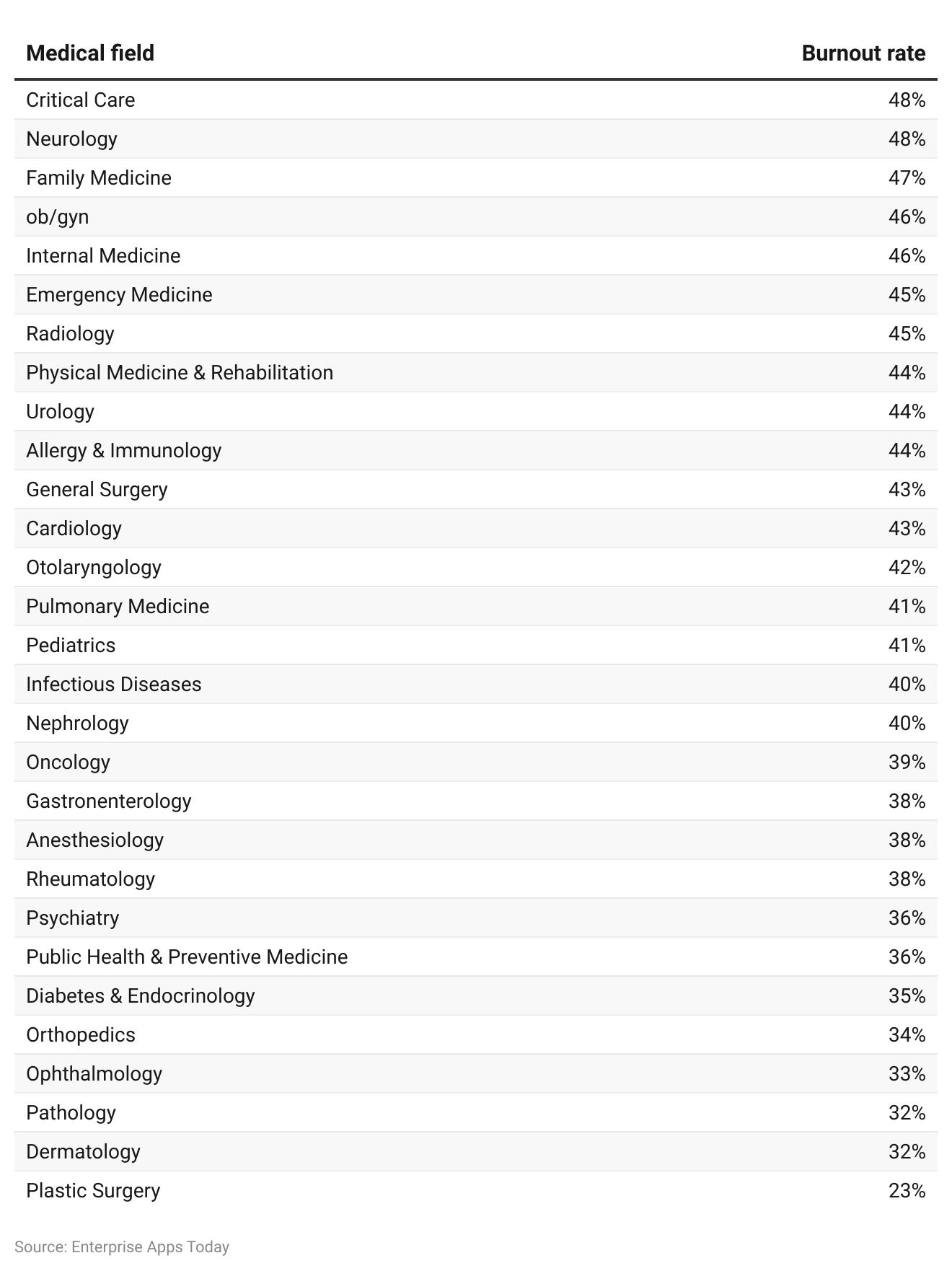 (Source: ZIPPIA)
(Source: ZIPPIA)
- As per the nursing burnout statistics, the chart explains the various nursing burnout fields as follows:
- Critical care and neurology (48%), family medicine (47%), Ob/Gyn and Internal medicine (46%), emergency medicine, radiology (45%), Physical medicine & rehabilitation, urology and allergy and immunology (44%), General surgery and cardiology (43%), Otolaryngology (42%).
- Furthermore, pulmonary medicine and pediatrics (41%), infectious diseases and nephrology (40%), Oncology (39%), Gastroenterology, Anesthesiology, and rheumatology (38%), Psychiatry and public health and preventive medicine (36%), diabetes and endocrinology (35%) orthopedics (34%), ophthalmology (33%).
- And pathology (32%), dermatology (32%), and plastic surgery (23%).
By Reasons
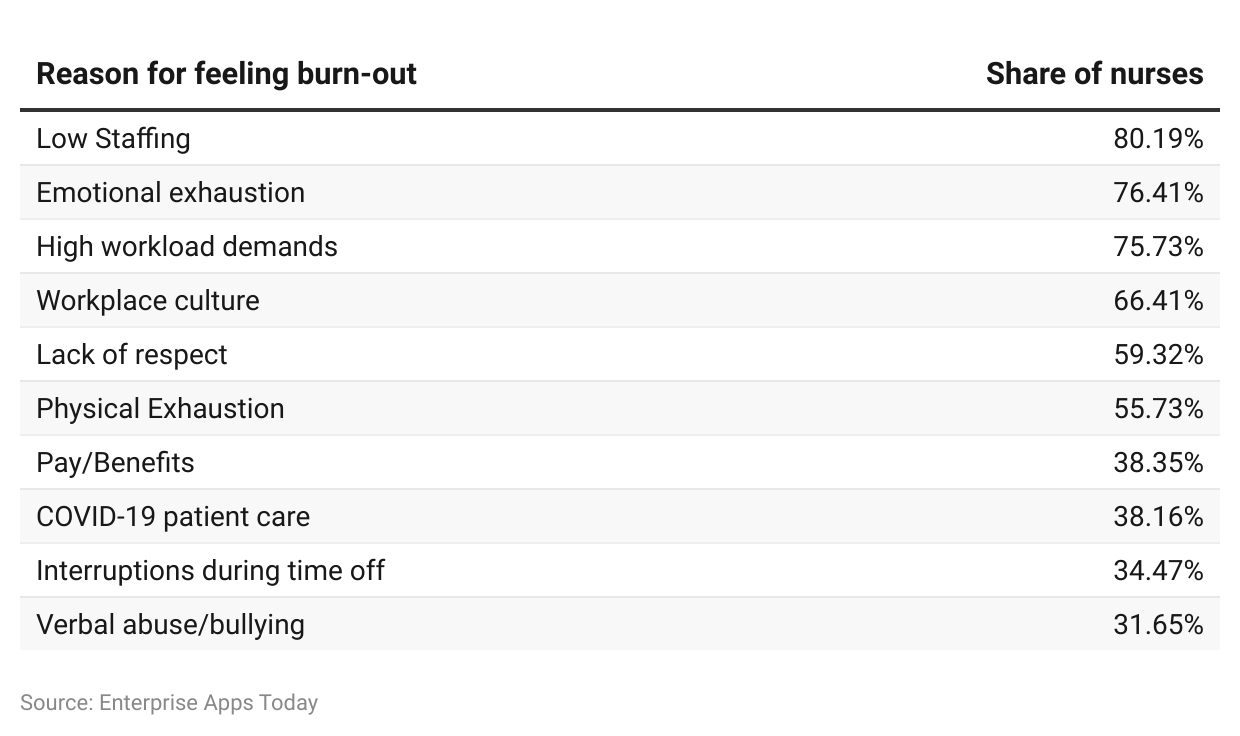 (Source: ZIPPIA)
(Source: ZIPPIA)
- On average today, nursing burnout statistics say that low staffing resulting in 80.19% was the main reason for burnout.
- 41% of the nurses around the world faced emotional exhaustion while 75.73% stated high workload demands as a burnout reason.
- Other reasons voted by the nurses are workplace culture (66.41%), lack of respect (59.32%), physical exhaustion (55.73%), pay/benefits (38.35%), COVID-19 patient care (38.16%), interruptions during time off (34.47%) and verbal abuse/ bullying (31.65%).
By Addressing The Issue
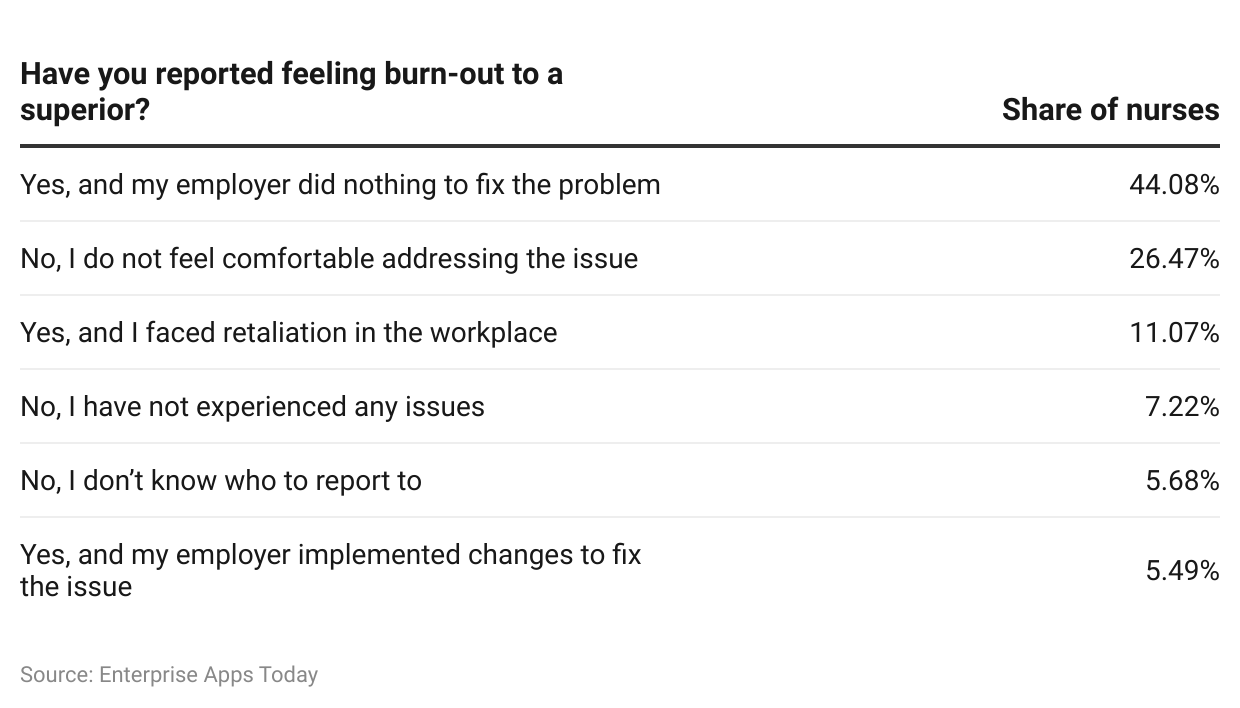 (Source: ZIPPIA)
(Source: ZIPPIA)
- While addressing the issue of nursing burnout, nurses were asked if they have shared the problem with their superior, and the following insights were captured.
- 08% of the nurses said, they informed their employer but didn’t see any effect.
- 47% were not comfortable addressing the issue.
- 07% of the nurses felt some positive difference while 7.22% said they did not experience any issue.
- 68% of them did not know the responsible person for reporting the problem and only 5.49% of nurses said their employer made the changes accordingly.
By Post-pandemic Effects On Nurses
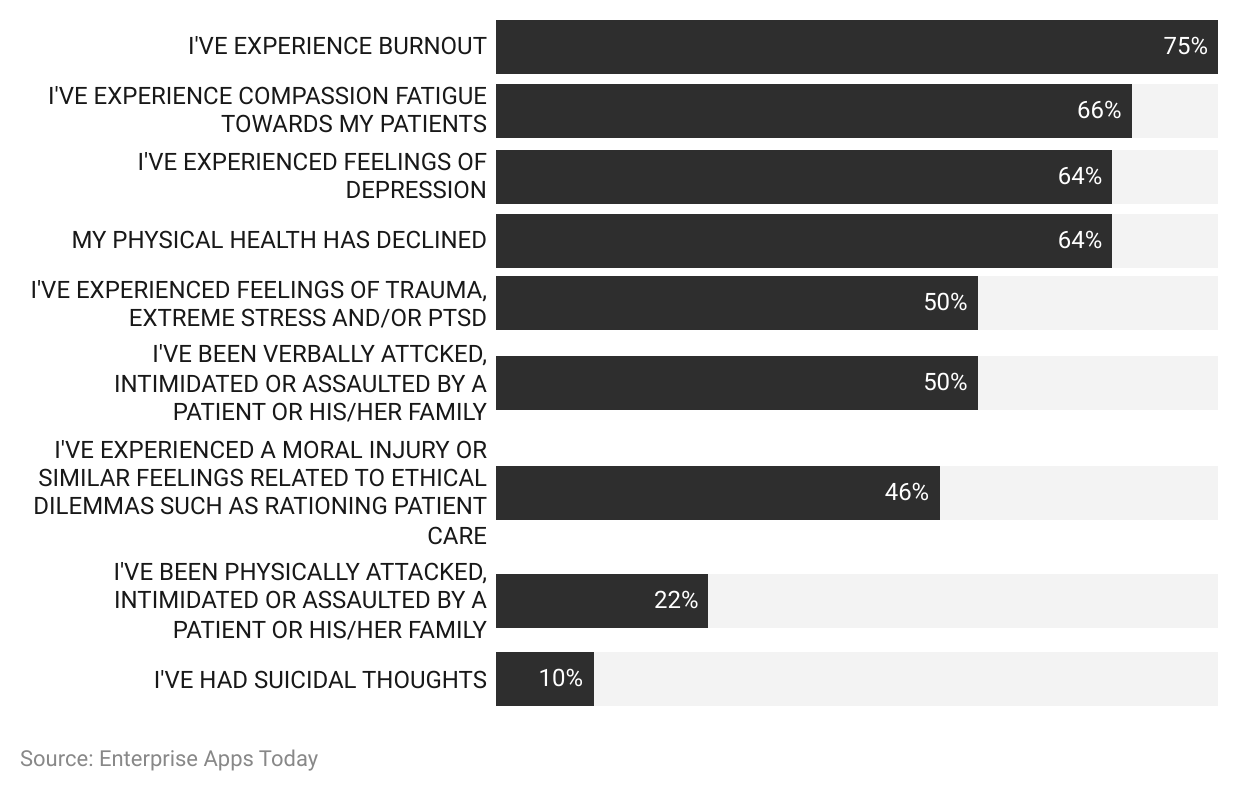 (Source: trusted)
(Source: trusted)
- Experiencing the various stress factors during and post-pandemic period as of 2022 are voted by nurses in the United States of America.
- 75% of the nurses felt burnout, while 66% fatigue towards patients.
- 64% of the nurses in the United States of America equally said that they felt depression and physical health decline in the same period.
- 50% of them respectively felt stress-related issues and verbal attacks from the patient’s families or patients.
- 46% and 22% belong to the reasons of ethical dilemmas physical attacks from patients or patients’ families in the United States of America.
- 10% of the nurses had suicidal thoughts.
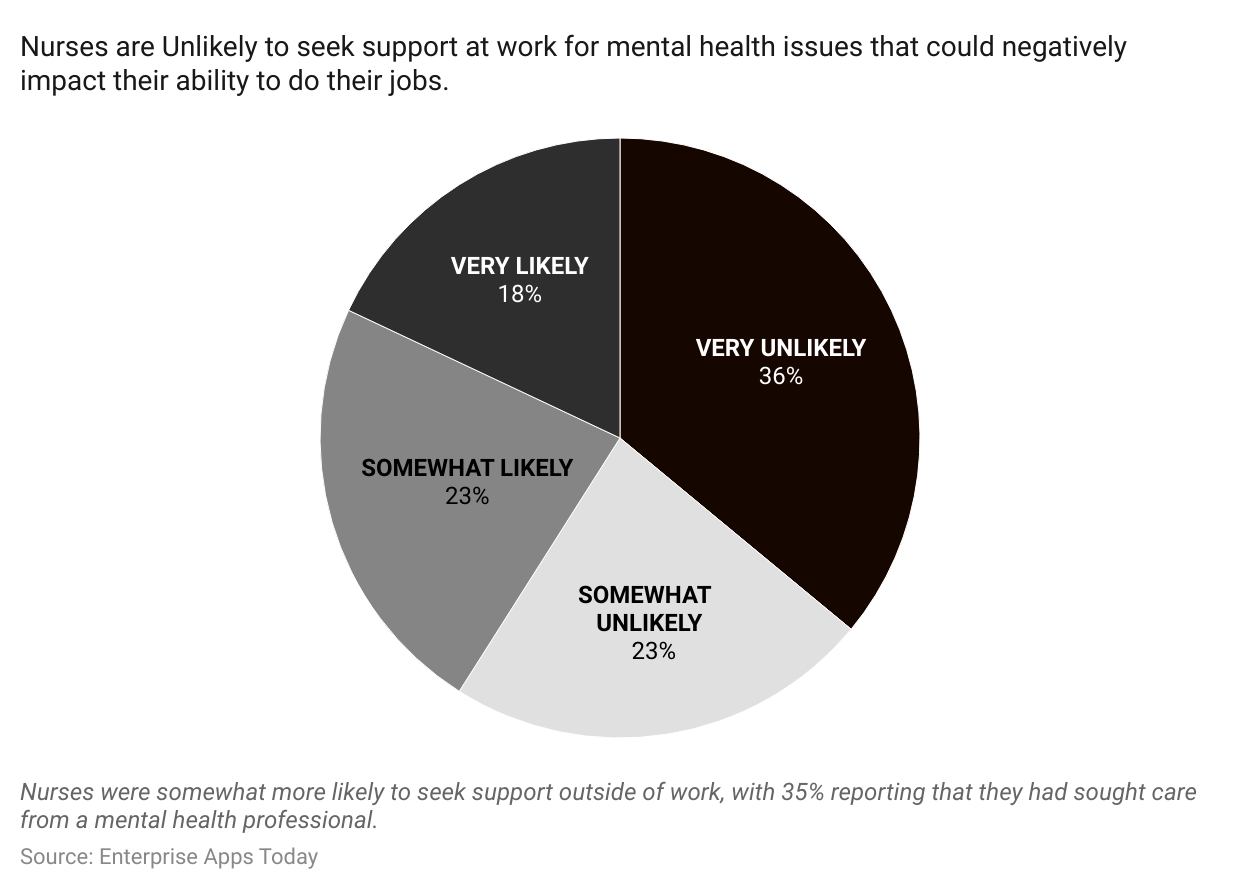 (source: trusted)
(source: trusted)
- According to the Nursing burnout statistics 2022,35% of nurses are more likely to get help from mental health care professionals other than their job requirements.
- On the other hand,23% respectively said they will somewhat unlikely and somewhat likely to take help from the same professionals.
- While 18% voted for very likely and 36% voted for very unlikely in the same category.
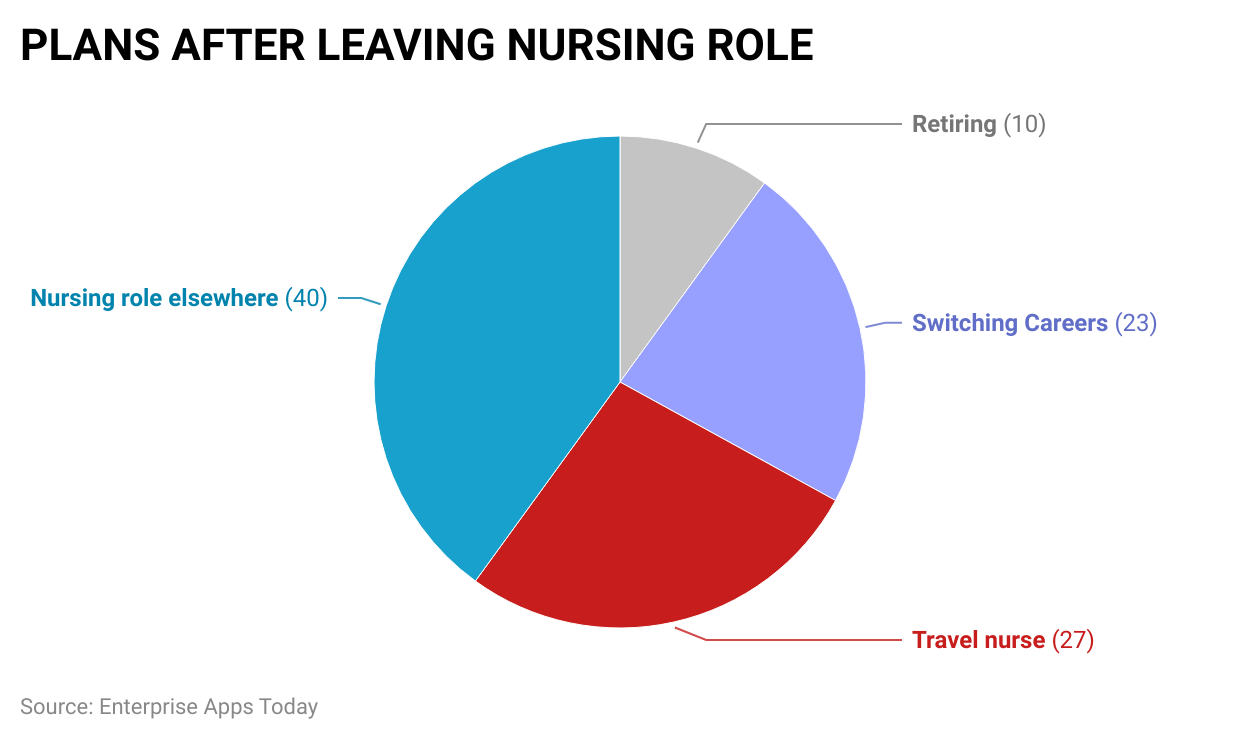 (Source: incrediblehealth.com)
(Source: incrediblehealth.com)
- Nurses around the world, feel burned out during work, 40% of the are searching for new roles in the same field while 27% of the nurses want to become travel nurses after leaving their current job.
- 23% of the nurses said they are totally switching careers and 10% want to retire from all their duties.
Conclusion
Concluding the above Nursing burnout statistics, it is clear that, the nursing workforce is yet a major issue all over the world. The issue became major during the pandemic time of 2020 when the number of patients drastically increased and there was only a limited number of nurses available without any proper safety measures for COVID-19 to look after the patients. Yet, after 2 years the issue is still burning as the hiring process is lower compared to the demand. With some good hopes, technological developments will bring some relief to the healthcare industry in the coming years!
FAQ.
Anxiety, exhaustion, frequent suicidal thoughts, problems with performance, inability to fulfill the shift, depression, and lack of motivation are some of the common signs of nursing burnout.
In order to reduce nursing burnout, it is expected for hospitals and superiors to allocate the shifts and workload equally and provide emotional support, motivation, and increment. Hire more nurses and provide work-life balance
Following are the ways to cure existing nursing burnout stage: hospitals can provide mental and health-related programs, increase break time, by providing emotional support, etc..

By conducting scientific research, I write about illness, health and healthcare. As a professional medical writer, my experience includes creating feature articles for newsletters and websites as well as research news stories for doctors and researchers. Reading has been an integral part of me since childhood - I'm fan of "Friends" and the "Harry Potter series". Before this career, I was employed by a French multinational company. However, my passion for reading led me to pursue writing professionally; my first Amazon-published short story entitled "The envelope that changed our lives" has recently been released. In my free moments, I enjoy long bike rides around town.